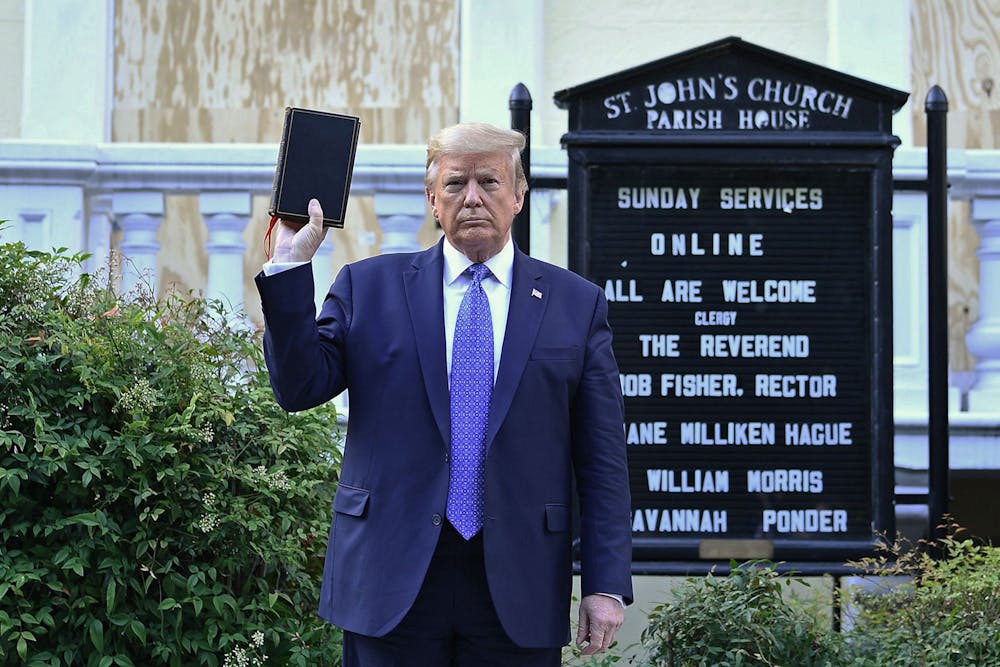We live in a nation dominated by Christian ideas and values. They affect nearly every part of our lives, and politics and legislation are no exception.
No president within the last 100 years has been elected without claiming to be a Christian. It seems nearly impossible for anyone to win an election without making this claim.
The United States is not supposed to be a theocracy. This much is clear in the language of the Constitution. The U.S. is meant to be a place where anyone can practice whatever religion they want, or not practice at all, as long as it doesn’t infringe on the rights of others.
The U.S. is a country of diverse religious beliefs. That is one of the things that makes this country great, and it’s why no religious ideology should inform legislation.
One does not have to dig deep to find examples of high profile politicians invoking Christianity in their speeches. Last year, Republican Rep. Lauren Boebert said that the church has “relinquished too much authority to government,” and that “we should not be taking orders from the government, the government should be looking at the church.”
Boebert is clearly not fluent in the secular language of the Constitution. Nonetheless, cheers erupted from the crowd.
The founding fathers felt strongly about secularism in government – the idea that religious ideologies should not influence legislation. They saw how people in Europe were persecuted for having differing religious views.
Some of them, including George Washington and Thomas Jefferson, were deists. They believed that reason and logic were more reliable tools for decision-making than religion was. They intentionally included language in the Constitution that separated church and state to mitigate the religious persecution they had witnessed.
Over the years, religion has been creeping into the forefront of American democracy. In 1972, the Supreme Court ruled in Wisconsin v. Yoder that the Amish, a fundamentalist Christian group which forgoes modern technology, are permitted to remove their children from school after grade eight. The court's argument was that if the Amish were forced to go to school through high school, then it would infringe upon their right to practice religion.
This ruling effectively made it legal for parents to withhold their children from a proper education because of their religion. I would consider this to be child neglect, if not outright abuse. Children should be allowed to get a fair education so that when they are adults, they are able to think for themselves.
When the Supreme Court overturned Roe v. Wade last week, it opened the door for religious politicians to immediately limit women’s bodily autonomy. Indiana’s own Mike Pence has said that he does not believe letting states decide on abortion is enough, calling for a complete ban.
“Having been given this second chance for life, we must not rest and must not relent until the sanctity of life is restored to the center of American law in every state in the land,” Pence said.
This comment comes not from a scientific or logical perspective, but a religious one. He fails to demonstrate how one person has the right to use another person’s body without their consent.
This week, the Supreme Court ruled in favor of a high school football coach who had his team pray on the field after games. The school district claimed they did not want to allow the coach to pray publicly, because it gave the appearance as though the school was endorsing a particular religion.
The court ruled in favor of coach Joseph Kennedy, saying that it is acceptable for a public school employee to either force a player to pray to a god they may or may not believe in or alienate the player entirely. I don’t need to explain how that might be bad for a football team’s morale and camaraderie .
Also this week, the Supreme Court ruled in Carson v. Makin that Maine must give taxpayer funding to religious schools. These schools are not required to give a secular education, so they are free to incorporate whatever religious teachings they want into their curriculum. It does not matter if those teachings are consistent with reality.
The conservative super majority in SCOTUS seems to be demolishing hundreds of years of legal precedent that separates church and state. U.S. citizens should not be forced or compelled into support for specific religions. It is simply unconstitutional.
Carter DeJong is a secular humanist studying journalism at IU.






